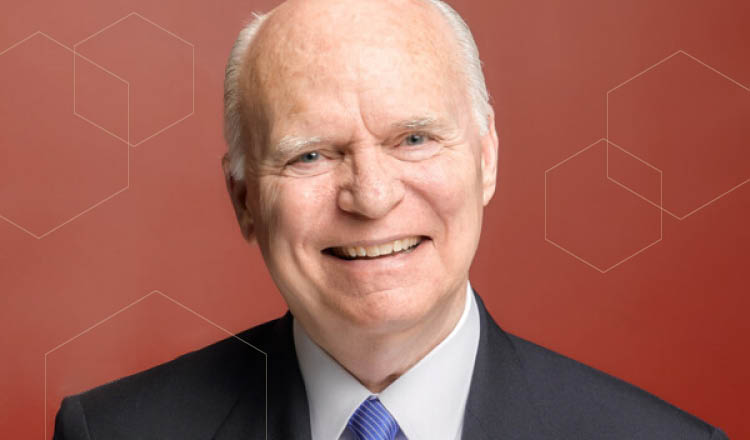The Role of the Reporter — and the Reader — in 21st Century Political Journalism
This is the second installment in a multipart series with Brian Lamb (LA’63, HDR LA’86), the founder of C-SPAN. Lamb retired from his day-to-day responsibilities with C-SPAN in 2019. Purdue’s Brian Lamb School of Communication is named in his honor.
Two decades into the 21st century, journalism stands at an interesting juncture. Newspaper circulation has fallen drastically, and, according to a 2018 Pew Research study, more Americans look to social media for their news than print journalism. While digital-native newsrooms have increased hiring as more Americans turn to online sources for their news, they haven’t been immune to layoffs.
But at the same time that news organizations have struggled, there is an incredible amount of information in the hands of everyday Americans — a level of information we’ve never experienced before in history. Google. Social media. Wikipedia. There’s a practically limitless horizon of information, misinformation, slant, and spin.
Doesn’t the journalist have a crucial role to play in helping navigate this landscape? Brian Lamb shares his perspective on where things stand today compared with generations past.
“Today, unfortunately, it’s gone back to the 1920s where journalism was on a side,” Lamb reflects. “If you look around today, almost every major institution in journalism is on somebody’s side in their headlines, their stories, or the placement of their stories. They’re all committed — either for or against something — which was not the case when I was growing up.”
Today, the responsibility lies with the viewer.
“The best thing you can do today is try to understand what is going on with journalists and different media organizations,” Lamb advises. “It’s a trite phrase, but it would come under the umbrella of media literacy. Find out who owns things. And once you find out who owns things and understand their politics, you can find out why they’re doing certain things. It’s much more on our shoulders today than it’s ever been to figure out where to go for information.”
Learn why Brian Lamb is hopeful that this generation can take on Washington.
“The bigger they become, the less they want to talk to you.”
In Lamb’s own career, he has seen how quick politicians are to dodge the tough questions.
“C-SPAN doesn’t do very well with a lot of members of Congress — they don’t want to take the time to talk for an hour,” Lamb comments. “They’re used to going on one of the shows and talking for seven minutes; they know they can get in and out without doing themselves a lot of damage.”
He doesn’t have any regrets, though, in terms of the countless interviews he’s done over half a century.
“Would I have liked more time with different people? Sure. One example: Bill Clinton promised us an hour in the Oval Office, and he gave us 20 minutes. But that’s just the way that this town works.”
In a 2019 discussion with the Carnegie Council for Ethics in International Affairs, Lamb gave more of the backstory. President Clinton had been running more than 30 minutes behind. By the time they sat down to start the interview, their scheduled hour was almost up.
“We sat down, he’s behind his desk, and I’m sitting there ready to start the interview. I ask him a question and another question. All of a sudden, I look up at our camera person and he says …” Cut. On camera, Lamb makes a slashing motion across his throat.
“I’m thinking, ‘They’re not gonna do this to me!’ And so I kept asking questions, and then I got a severe now.” Lamb repeats the slashing motion, this time with dramatic emphasis. “In spite of the fact that I’m just a lowly Hoosier from Lafayette, Indiana, the hair did stand up on the back of my head. I don’t care if it was the president of the United States — I was so mad.”
In our conversation, Lamb clarifies that his complaint wasn’t so much with the president but rather with his handlers.
“In Washington, DC, your chain gets jerked a lot — in particular by people who work for politicians and think they’re doing their bosses a favor. Often in the end, it’s their idea and not their bosses’.”
A Journey Back in Time
Leaving behind the world of handlers eager to prove themselves — and while we’re at it, cagey politicians who won’t give a straight answer — I ask Lamb if he could interview anyone, past or present, who would it be?
“You’re gonna be surprised,” Lamb says. “It would be Thomas Paine. Paine had a tremendous impact on the United States, France, and Great Britain. He was one bright human being and had a very, very strong impact on this country.
“I would have never known, frankly, who he was when I attended Purdue, but I’ve spent a lot of time reading about him, and I would love to sit down and interview him. It probably wouldn’t have been all that pleasant, but who knows?”
His second pick? Alexis de Tocqueville.
“At C-SPAN, we did a whole series of programs on Tocqueville, which drove this place crazy. But we ended up going to 55 different communities in the United States where Tocqueville visited.
“It’s a great example for young people — at the age of 25 or 26 years old — that he could have that kind of impact on the United States. To this day, it’s still one of the two or three best books ever written on democracy.”

